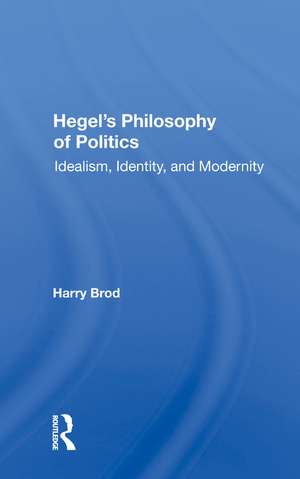Hegel's Philosophy Of Politics: Idealism, Identity, And Modernity
Autor Harry Broden Limba Engleză Hardback – 23 mai 2019
| Toate formatele și edițiile | Preț | Express |
|---|---|---|
| Paperback (1) | 244.09 lei 6-8 săpt. | |
| Taylor & Francis – 23 dec 2022 | 244.09 lei 6-8 săpt. | |
| Hardback (1) | 763.39 lei 6-8 săpt. | |
| Taylor & Francis – 23 mai 2019 | 763.39 lei 6-8 săpt. |
Preț: 763.39 lei
Preț vechi: 1026.95 lei
-26% Nou
Puncte Express: 1145
Preț estimativ în valută:
146.09€ • 151.96$ • 120.61£
146.09€ • 151.96$ • 120.61£
Carte tipărită la comandă
Livrare economică 14-28 aprilie
Preluare comenzi: 021 569.72.76
Specificații
ISBN-13: 9780367012441
ISBN-10: 0367012448
Pagini: 228
Dimensiuni: 143 x 229 mm
Greutate: 0.41 kg
Ediția:1
Editura: Taylor & Francis
Colecția Routledge
Locul publicării:Oxford, United Kingdom
ISBN-10: 0367012448
Pagini: 228
Dimensiuni: 143 x 229 mm
Greutate: 0.41 kg
Ediția:1
Editura: Taylor & Francis
Colecția Routledge
Locul publicării:Oxford, United Kingdom
Cuprins
Introduction -- The Historical Basis of Political Philosophy -- The Philosophical Politics of Modernity -- The Contradictions of Modernity -- Property and Personhood -- The Dialectic of Civil Society -- Public Opinion and Its Representation -- The Rational State -- Contemporary Applications of Hegel's Philosophy of Politics
Descriere
This valuable book makes a significant contribution to the current revival of interest in Hegel. Brod demonstrates the central unifying role the collective historical social consciousness plays in Hegel's thought. But far from leading to totalitarian conclusions, this emphasis upon the social actually leads Hegel toward a "third way" between the anarchic individualism of unregulated market structures and the repressive collectivism of unopposed state power. Similarly, Hegel can be seen as a potentially moderating influence on his two quarrelsome offspring, Marxism and liberalism. Hegel emerges here as a thinker with relevance for our own time, with lessons for current communitarian critiques of liberalism, the revolutions in Eastern Europe, modern jurisprudence, and feminist theory. A virtue of Brod's treatment is its clarity and lack of jargon. Hegel receives a welcome demystification that leaves his political philosophy stronger and more viable rather than diminished.
